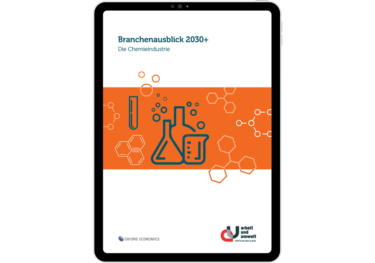Consulting | 08 Nov 2021
Industry Outlook 2030+ | The German Chemical Industry

Our study analyses the strengths and weaknesses, opportunities, and threats for the German chemical industry in light of future transformation trends. A focus lies on the conditions for the successful decarbonisation of the industry.
The German chemical industry is facing extensive challenges that will fundamentally alter many businesses over the coming years. Due to its high energy intensity, achieving carbon emission reduction targets poses a major challenge. Moreover, increasing competition from abroad—especially from China and the US—as well as the transition to a so-called Chemistry 4.0 will require profound adjustments of the chemical industry.
The Sector Outlook 2030+ “Chemical Industry” is based on an analysis of the latest industry research and data. The following research questions are at its core:
(1) What is the current status of the German chemical industry with regards to company structure, employment, and investment and innovation activity, and what is the economic and trade policy setting under which it operates?
(2) To what extent is the German chemical industry affected by transformation trends such as digitalisation, globalisation, and demographic change?
(3) Which technologies and processes—but also regulations and political settings—can contribute to a successful sustainability transformation and decarbonisation of the industry?
(4) What are the strengths and weaknesses, opportunities, and threats for the German chemical industry with regards to production, innovation and transformation in the near- to medium-term?
Read the full report in German
Read the English executive summary
Our economic consulting team are world leaders in quantitative economic analysis, working with clients around the globe and across sectors to build models, forecast markets and evaluate interventions using state-of-the art techniques.
Related Services

Post
The economic impact of abandoning the WTO
Oxford Economics have been commissioned by the International Chamber of Commerce (ICC) to provide an independent assessment of the economic impact of WTO dissolution. This report details our findings and the assumptions underpinning our analysis.
Find Out More
Post
The economic impact of the sports activities of public service media
This study shows how the sports activities of public service media supported €4.5 billion of GDP and 57,000 jobs across 31 European countries in 2022. The report also highlights wider economic benefits of public service media sports coverage, such as the way in which it leverages sponsorship income for sports bodies.
Find Out More
Post
Global Trade Education: The role of private philanthropy
Global trade can amplify economic development and poverty alleviation. Capable leaders are required to put in place enabling conditions for trade, but currently these skills are underprovided in developing countries. For philanthropists, investing in trade leadership talent through graduate-level scholarships is an opportunity to make meaningful contributions that can multiply and sustain global economic development.
Find Out More